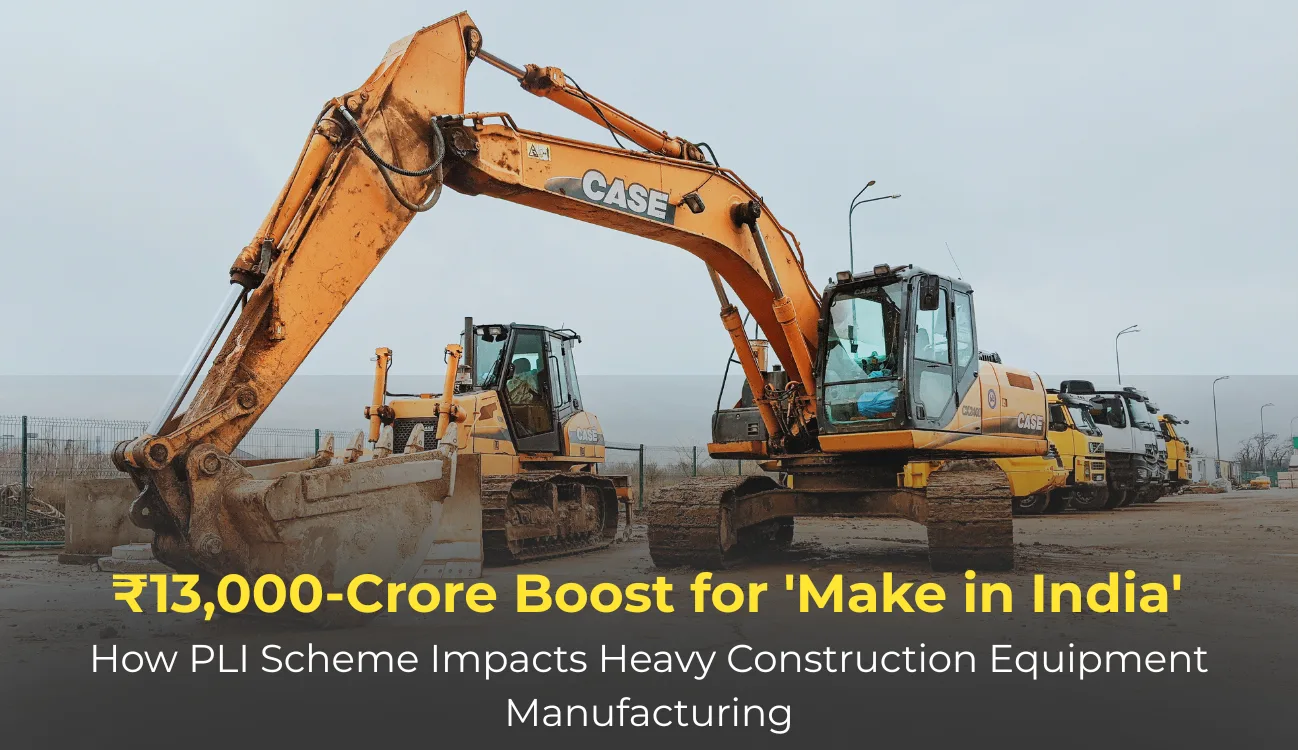
By Chayan Sarkar
Sep 12, 2025
( 0 )
The Indian government is preparing a ₹13,000-crore incentive plan under the PLI scheme to strengthen heavy construction equipment manufacturing. Covering key machinery like tunnel boring machines, cranes, backhoe loaders, and engines, the policy targets 50% domestic value addition to reduce import dependence. Beneficiaries include manufacturers, SMEs, contractors, and fleet owners, with benefits like lower costs, faster availability, and stronger servicing. Supported by Desi Machines, this initiative aligns infrastructure growth, self-reliance, and global competitiveness.
New Delhi: The Indian government will announce a ₹13,000 crore incentive package for the heavy construction equipment sector, a move that will help lessen the nation’s dependence on imported equipment, boost indigenous production, and support the nation’s ambitious agenda for the development of the nation’s infrastructure.
The programme under the Ministry of Heavy Industries (MHI) has been devised and is under inter-ministerial consultations with the ministries of Mines, Commerce & Industry, Finance, NITI Aayog, and the Ministry of New & Renewable Energy. Upon its clearance by the Union Cabinet, it shall be one of the largest policy pushes for the indigenous construction equipment sector ecosystem.
According to Financial Express, the incentive package will cover the high-value segments of equipment, which, though indispensable for the development projects of the country but are now very import-intensive. They include tunnel boring machines (TBMs), ropeway systems, backhoe loaders, tower and crawler cranes, engines, and transmission systems.
It is a performance-linked incentive (PLI) programme wherein manufacturers are remunerated for incremental production and output. The condition of the programme shall be domestic value addition (DVA) of up to 50%, i.e., manufacturers develop a healthy Indian supply system and are not over-dependent on imported parts like engines, control systems, specialty steel, and sensors.
The Indian construction equipment market, currently estimated at USD 9.5 billion, is expected to nearly triple by 2030 with the upswing of infrastructure development under initiatives such as Bharatmala, Sagarmala, Gati Shakti, and the National Infrastructure Pipeline.
Nonetheless, excessive dependency on imported materials and parts remains a thorn for manufacturers and contractors, just like their Chinese counterparts. For instance, sophisticated tunnel boring machines and special-purpose cranes are imported at hefty prices, escalating project costs and prolonging timelines.
The proposed ₹13,000-crore package aims to:
Industry executives think the program can trigger a multiplier effect across the overall system from manufacturers, through the contractors, to the fleet owners.
Industry leaders have welcomed the proposal, noting that it comes at a crucial time when demand for heavy equipment is surging in India’s fast-growing construction sector. Companies with significant domestic operations are expected to benefit the most, while multinational OEMs may need to deepen their localisation strategies to qualify for incentives.
According to Financial Express, government officials expect that by strengthening local manufacturing, India can emerge as a global hub for construction equipment exports over the next decade.
While the scheme promises transformative potential, industry stakeholders are also watching out for certain critical aspects:
For contractors, builders, and fleet owners, such policy changes sound complex. That is where Desi Machines enters the scenario.
As India’s trusted platform for heavy construction equipment, we provide:
With over a decade of expertise in the sector, Desi Machines is uniquely positioned to guide contractors through this new era where domestic policy and heavy equipment procurement intersect.
The government’s proposed ₹13,000-crore incentive plan for the construction equipment industry is a strategic step to align India’s infrastructure growth with domestic manufacturing capabilities. By focusing on localisation, reducing import dependence, and incentivising production, the scheme is expected to accelerate the country’s journey towards self-reliance in heavy construction equipment.
When the policy framework emerges, the fleet owners, builders, and contractors will need to evolve into new procurement and operational opportunities. At Desi Machines, we are committed to clarity, comparisons, and insights with the help of which every purchase of heavy equipment is future-proof, compliant, and profitable.
The plan is a performance-linked incentive (PLI) scheme designed to boost indigenous production of heavy construction machinery, reduce import dependency, and support infrastructure development projects.
The scheme will focus on import-intensive, high-value equipment like tunnel boring machines (TBMs), ropeway systems, backhoe loaders, tower and crawler cranes, engines, and transmission systems.
Manufacturers like JCB India, Tata Hitachi, Ashok Leyland, ACE, and Cummins India will benefit through incentives for higher production, R&D investments, and localisation of components.
To qualify for incentives, manufacturers must source at least half of the components such as engines, sensors, specialty steel, and control systems-locally, strengthening India’s supply chain ecosystem.
Fleet owners and contractors can expect lower equipment costs, faster availability of machines like TBMs and cranes, improved servicing networks, and reduced project delays.
Yes. With strong localisation, innovation, and export competitiveness, India is expected to become a major exporter of heavy construction equipment over the next decade.
10 Most Advanced Electric Excavator Machines of 2025
Heavy Construction Equipment Financing Loan: Complete Guide
© 2025 Desi Machines All rights reserved.
Designed & Developed by PromotEdge
Desi Machines is a platform where you can see and compare construction equipment. It showcases images, brochures, features, technical specifications, brand details & dealer information. All these are taken from respective brand websites, brochures, and other public resources. We do not claim ownership of these materials and strive to ensure their accuracy. However, the disparity may happen and we advise users to verify directly with respective brands and dealers. Desi Machines is not liable for any inaccuracies or reliance on the information provided. Use of this website is at your own discretion.